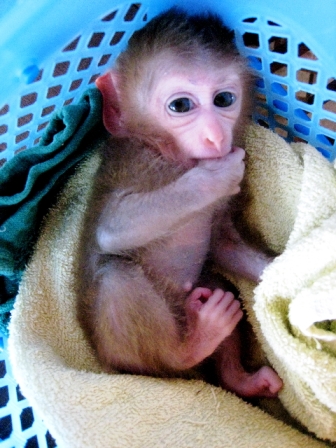
tiny macaque baby
 tiny macaque baby |
Click the photo above to see an album of photos. Close the window to return to this page
Read Previous Episode: A Robbery or Next Episode: Time Off
|
Jan 2009
Not a week goes by that reports of illegally traded animals or incidents
of gross abuse are reported to Edwin Wiek, the director of the Wildlife
Rescue Center. The center's proximity to the Thai-Myanmar border means
that Edwin hears of animals, caught in the wild in Myanmar, being
transported illegally across the Thai border on their way to prime sales
centers in China. Edwin follows up as best he can, petitioning the
Government to lay charges, following up on resultant court cases and
writing articles publicizing the abuses. Often this results in new
residents for the Center. At the end of December a truck was stopped
near Hua Hin, a town close to the center. Inside were discovered the
bodies of six tigers, endangered animals in every Asian country. The
fact that these animals are valuable ingredients for traditional Chinese
medicine makes this a lucrative practice. Edwin was active ensuring that
the perpetrators were charged and writing letters decrying the incident.
The lead editorial in the Bangkok paper publicized backed Edwin’s
concerns. At least this was a step in the direction towards protecting
endangered animals.
Elephants are both revered and maltreated by the Thai people. It is legal to raise elephants as workers but it is illegal to capture elephants living in the wild. Ray and I were thrilled to ride elephants on two occasions in the past, once in northern Thailand and once in the Chitwan of Nepal. It was only during our time at the Center that we learned what the elephants endure while being trained for the tourist industry. It is easier on elephants bred in captivity, but for wild elephants it is literally torture. All six elephants currently living at the Center bear scars from beatings and restraints used during a subjugation process. Positive reinforcement is unknown when training elephants.
Several of the elephant volunteers accompanied Edwin to visit elephants
confiscated by the Thai Wildlife Department. They brought milk for a
baby elephant, estimated to be no more than five months old, far too
young to be taken from his mother. The aim of the Center was teach the
Wildlife Department how to care for the baby elephant. There are many
other organizations in Thailand who want to adopt the baby so it is not
likely to become a Center resident. The visit at least reinforced the
goodwill of the Center. A second elephant confiscated by the Wildlife Department is not so lucky. The current owner tried to take it across the Myanmar-Thai border in late December with ownership papers which were patently false. The owner claims he thought the elephant was raised in captivity but the evidence was that it was a wild elephant. The poor beast, an adult female about 18 years old, had at least fifty wounds on her body that had been left untreated for several months. The previous owner was probably the culprit. Edwin had hoped to return to the Center with this elephant but he returned empty handed. Even though the elephant is now receiving medical care, she may not survive. The wounds are too severe and her will to live is fading.
There was an article in the Bangkok newspaper recently quoting Edwin's
request to investigate the sudden increase in Orang-utans at the Phuket
Zoo. It is suspected that they were obtained illegally, perhaps smuggled
from Malaysia or Myanmar.
The center did obtain new residents this week. Two gibbons were found in
a cramped small cage, waiting to be sold as pets. They now have large
cages in the Quarantine section and will eventually join the rest of the
gibbon population. A vet in a local town alerts the Center to animals
she comes across that are either abused or obtained illegally. The
center now has a tiny baby macaque who is so young she must be bottle
fed every two hours and kept in the room of one of the Center staff until she is old
enough to be adopted by one of the other macaques.
Edwin and Cheryl, an Aussie Vet who has joined the permanent staff of
the Center recently, drove to Ranong to investigate the case of an
Asiatic Black Bear, confiscated by the Wildlife Department. Cheryl was
able to perform surgery on two other bears during the visit, but had to
leave the confiscated bear behind. The Wildlife Department wants to care
for it themselves. It may eventually make the trip to the Center but not
now. |
Return to Malaysia-Thailand Intro
Return to Travels
Return to Introduction